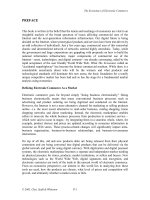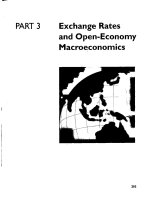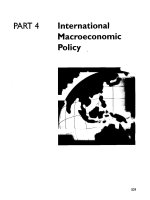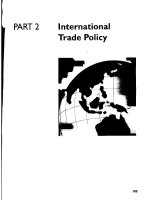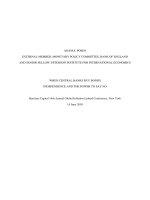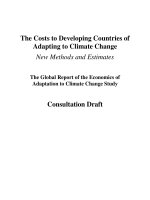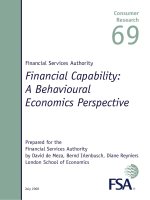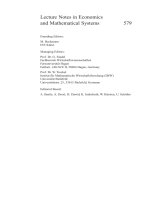naked economics - wheelan, charles
Bạn đang xem bản rút gọn của tài liệu. Xem và tải ngay bản đầy đủ của tài liệu tại đây (1.45 MB, 302 trang )
More praise for
naked economics
by Charles Wheelan
“I recommend this book to anyone who wants to gain an understanding of basic
economics with little pain and much pleasure.”
—Gary Becker, 1992 Nobel Prize winner in Economics
“I devoured Naked Economics whole, start to finish. Finally an economist was
speaking my language! Finally I could grasp not only the meanings of all those
acronyms I only pretended to understand, but how the institutions and concepts for
which they stand might—and do—impact my life. Bravo, Charles Wheelan, for doing
the impossible: making the study of economics fascinating, comprehensible, and
laugh-out-loud funny.”
—Deborah Copaken Kogan, author of Shutterbabe: Adventures in Love and War
“From simple supply and demand to the much more frightening subject of monetary
policy, this book manages to explain our global economy in a way that is (gasp!)
actually entertaining.”
—Book Magazine
“Translates the arcane and often inscrutable jargon of the professional economist into
language accessible to the inquiring but frustrated layman…. Clear, concise,
informative, [and] witty.”
—Chicago Tribune
“In just a few easy lessons,…Wheelan can teach the most innocent reader to think like
an economist.”
—Kirkus Reviews
“Makes economics accessible, comprehensible and appealing…. Wheelan’s
simplicity does not mask the detailed encapsulation of complicated issues, such
as relative wealth, globalization and the importance of human capital. He smartly
shows that while economic consequences can be global, they are also a part of
everyday life.”
—Publishers Weekly
naked economics
Undressing the Dismal Science
fully revised and updated
CHARLES WHEELAN
Foreword by Burton G. Malkiel
W. W. Norton & Company
New York • London
Copyright © 2010, 2002 by Charles Wheelan
Foreword copyright © 2002 by Burton G. Malkiel
All rights reserved
“Mum’s the Word” reprinted with permission. Further reproduction prohibited. ©
1998 The Economist Newspaper Group, Inc. www.economist.com.
“Two Cheers for Sweatshops,” Hearts and Heads,” and “I Love D.C.” reprinted with
permission of the New York Times.
For information about permission to reproduce selections from this book, write to
Permissions, W. W. Norton & Company, Inc., 500 Fifth Avenue, New York, NY
10110
Library of Congress has catalogued an earlier edition as follows:
Wheelan, Charles J.
Naked economics: undressing the dismal science/Charles Wheelan; foreword by
Burton G. Malkiel.—Fully rev. and updated.
p. cm.
Includes bibliographical references.
ISBN: 978-0-393-07975-3
1. Economics. I. Title.
HB171.W54 2010
330—dc22
2009052148
W. W. Norton & Company, Inc.
500 Fifth Avenue, New York, N.Y. 10110
www.wwnorton.com
W. W. Norton & Company Ltd.
Castle House, 75/76 Wells Street, London W1T 3QT
For Leah
Contents
Foreword by Burton G. Malkiel
Introduction
Acknowledgments
1
The Power of Markets: Who feeds Paris?
2
Incentives Matter: Why you might be able to save your face by cutting
off your nose (if you are a black rhinoceros)
3
Government and the Economy: Government is your friend (and a round
of applause for all those lawyers)
4
Government and the Economy II: The army was lucky to get that
screwdriver for $500
5
Economics of Information: McDonald’s didn’t create a better
hamburger
6
Productivity and Human Capital: Why is Bill Gates so much richer than
you are?
7
Financial Markets: What economics can tell us about getting rich quick
(and losing weight, too!)
8
The Power of Organized Interests: What economics can tell us about
politics
9
Keeping Score: Is my economy bigger than your economy?
10
The Federal Reserve: Why that dollar in your pocket is more than just a
piece of paper
11
International Economics: How did a nice country like Iceland go bust?
12
Trade and Globalization: The good news about Asian sweatshops
13
Development Economics: The wealth and poverty of nations
Epilogue
Life in 2050: Seven Questions
Notes
Foreword
by Burton G. Malkiel
It is widely believed that Scotsman Thomas Carlyle labeled economics the “dismal
science” well over one hundred years ago because it seemed boring, uninteresting,
unclear, and full of “on the one hand, on the other hand.” Indeed, Harry Truman is
reported to have said that to avoid ambiguity, he wanted to have “one-armed
economists.” In fact, Carlyle had something very different in mind. What Carlyle
reminded us was that scarcity was pervasive—that we have to make choices between
competing satisfactions, between jam today and jam tomorrow, and between
conflicting values and goals. Above all, the dour Scot emphasized that everything has
a cost and nothing can be produced without work and sacrifice.
To be sure, many people do believe that economics and economists are dismal in
the popular sense, that is, extraordinarily dull. As one definition goes: “An economist
is someone who is good with numbers but does not have the personality to be an
accountant.” The tarnished image of economists is in large part earned by their
tendency to opaque writing, their use of often inscrutable diagrams, and their
excessive use of mathematics. Moreover, they often fail to admit what they don’t
know.
Why is economics the butt of so many jokes, and why do students often become
glassy-eyed when confronted with the study of economics as a discipline? The
reasons, I think, are that economists generally do not write well and that most
economics texts rely far too much on algebraic manipulation and complex diagrams.
Moreover, few economists are able to transmit the considerable excitement of
economic analysis or to show its relevance to everyday life. This book by Charles
Wheelan changes all that. Wheelan has an anti-Midas touch. If he touched gold he
would turn it to life.
This is a truly unique book. It contains no equations, no inaccessible jargon, and
no inscrutable diagrams. While equations and diagrams may well be behind many of
the ideas in economics, Wheelan shows that they can be reduced to plain English. He
boils economics down to its essentials. He demonstrates that the term “lucid
economist” is not an oxymoron.
In these pages, we see how many of the criticisms of economists are undeserved.
Economic analysis is a hard and complex subject—in many cases far more complex
than analysis in the physical sciences. Physics can elegantly explain simple contained
systems such as the planets revolving around the sun or electrons in orbit around an
atom. But even the physical sciences have difficulty understanding phenomena in
nature. Weather forecasting is a case in point. Despite complex satellite observations
and intricate weather forecasting models, meteorologists often cannot improve on
very naive forecasting models such as “The weather tomorrow will be exactly like it is
today.” To be sure, the inertia model misses all the turning points but retains an
excellent overall record. And when forecasters are asked to make longer-run
projections on such subjects as global warming, their range of forecasts makes
economic forecasts appear precise by comparison.
Economics is more difficult than the physical sciences because we cannot usually
run controlled laboratory experiments and because people do not always behave
predictably. A whole new branch of behavioral economics has attracted considerable
attention by combining the insights of psychologists and economists, but we still are
unable to predict individual behavior with any precision. But that we are far from
understanding everything does not mean that we understand nothing. We do know
that individual behavior is strongly influenced by incentives. We do know that there
are many logical regularities, and we have enjoyed a steady accumulation of
knowledge. We do know that every sale involves a purchase and that obvious
opportunities for profit are rarely overlooked—the basic idea behind the theory that
our securities markets are remarkably efficient.
And as inexact as economic science may be, it has a direct impact on our lives and
it has a critical role to play in government policymaking. Economists influence all
branches of government. The tasks of promoting economic growth and high
employment while avoiding inflation have long been recognized as the domain of
government economists. Remember Bill Clinton’s most successful campaign slogan
during the 1992 election? “It’s the economy, stupid!” Promoting competition and
restraining monopolies (Justice Department), limiting pollution (Environmental
Protection Agency), and providing medical care (Health and Human Services) are
examples of major activities within different cabinet departments that have crucially
important economic components. Indeed, it is hard to think of any political decisions,
be they on social, tax and expenditure, international, agricultural, or national security
issues, that do not have economic consequences. And however skeptical politicians
may be about the ability of economists to solve these problems, the economists’
advice is not ignored. Indeed, as John Maynard Keynes once wrote, “Practical men,
who believe themselves to be quite exempt from any intellectual influence, are usually
the slaves of some defunct economist. Madmen in authority, who hear voices in the
air, are distilling their frenzy from some academic scribbler of a few years back.”
The influence of economists is also increasingly pervasive in the business and
financial communities. Peter Lynch, the former manager of Fidelity’s Magellan mutual
fund, once opined that if you spent fourteen minutes talking to an economist you
would have wasted twelve minutes. Perhaps it is ironic that the investment
performance of professional mutual fund managers is now regularly evaluated based
on techniques developed by financial economists. Moreover, economists influence
countless other business decisions. They project product demand for companies as
diverse as General Motors and Procter & Gamble. They are employed in large
numbers by consulting firms engaged in business tasks from strategic planning to
inventory control. They help investment firms fashion portfolios of securities by
analyzing the trade-offs between expected return and risk. They advise chief financial
officers of corporations on dividend policy and on the effect of debt on the price of
the firm’s common stock. In our financial markets, option traders on the floors of the
major options exchanges carry hand-held computers programmed with an economic
model to tell them the prices at which they should trade put and call options. The fact
is that economic analysis is incredibly useful for investors and producers as well as
for government policymakers.
Ordinary consumers will also find that economics can illuminate many perplexing
everyday issues. Why is it so hard for individuals to buy health insurance? Why do we
stop at McDonald’s along a highway even though many other establishments may
make better hamburgers? Why do so many people apply to “prestige” colleges even
though many other institutions offer just as good an education at far lower prices?
Have you ever wondered what such common terms as “adverse selection,” “public
goods,” and “the prisoner’s dilemma” have to do with everyday life? These are among
the subjects treated in this delightful book.
It’s often said that if you ask ten economists the same question you will get ten
different answers. But I’ll wager that if you asked ten economists why there is a
shortage of cabs and apartments in New York City, all ten would tell you that
limitations on the number of taxi medallions and rent control are what restrict the
supply of these goods and services. There are certainly many areas where economists
are in virtual unanimous agreement. Economists overwhelmingly agree that free
international trade can improve the standard of living of the trading countries and that
tariffs and import quotas reduce general welfare. Economists generally agree that rent
controls reduce the volume and quality of housing. Economists were virtually
unanimous in their forecast that the horrific tragedy of September 11, 2001, would
lead to a contraction of economic activity. My own experience in government suggests
that there is far less difference in the views of economists (be they conservative
Republicans or liberal Democrats) than there is between economists and those who
come from different disciplines. Economists of contrasting political views agree
among themselves on most issues. A bipartisan majority of economists is quite likely
to unite on the opposite side of a bipartisan coalition of politicians.
The reason, I believe, is that economists have a unique way of viewing the world
and thinking about how to solve problems. Thinking like an economist involves
chains of deductive reasoning in conjunction with simplified models such as supply
and demand. It involves identifying trade-offs in the context of constraints. It
measures the cost of one choice in terms of the foregone benefits of another. It
involves the goal of efficiency—that is, getting the most out of limited resources. It
takes a marginalist or incremental approach. It asks how much extra benefit can be
achieved by incurring some extra cost. It recognizes that resources have many diverse
uses and that substitutions can be made among different resources to achieve desired
results. Finally, the economist has a predilection to believe that welfare is increased by
allowing individuals to make their own choices and to argue that competitive markets
are a particularly efficient mechanism for giving expression to individual choices. And
while all economic problems involve normative issues (views about what should be),
thinking like an economist involves an analytical approach that usually abstracts from
or at least downplays “value” issues.
This gem of a book is both well balanced and extremely comprehensive. It
recognizes the benefits of the free market in making our lives better and shows why
centrally controlled economies ultimately fail to increase the living standards of their
citizens. At the same time it recognizes the crucial role of government in creating the
legal framework that makes markets possible and in providing public goods. It also
understands the role of government in correcting situations when the free market
creates undesirable externalities such as environmental pollution or where private
markets will fail to produce some of the goods the country’s citizens desire.
Did you ever wonder why mohair farmers earned a subsidy from the federal
government for decades? Wheelan explains how politics and economics can lead to
such results. Do you really understand why Ben Bernanke is often referred to as the
second most powerful person in the United States? Wheelan demystifies the effect of
monetary policy on economic activity. Did you ever consider that you never fully
understood the final scene from the movie Trading Places when the bad guys were
wiped out in the commodities futures market? Wheelan makes the theory of supply
and demand completely accessible. Have you ever wondered if the people who protest
against globalization have a good point and whether either the developed or
developing nations would be better off with less economic integration? Wheelan will
make the issues crystal-clear. When you read the newspapers about disputes
concerning current economic issues, are you often perplexed and dismayed at the
cacophony of competing arguments? Wheelan parses the jargon and pierces the
politics to lay bare the essential issues. In so doing, he successfully transforms the
dismal science into a lively weaving of economics and politics into the fabric of
national discourse and policy.
Wheelan has produced a delightfully readable guide to economic literacy. By
boiling economics down to its essentials, he makes the reader a more informed citizen
who can better understand the major economic issues of the day. He shows that
economics can be explained without graphs, charts, and equations. He demonstrates
that economic analysis can be intensely interesting. The book should provide a useful
supplement for the college and high school basic course on the economy. More
important, it can stand on its own as an introduction to the field that will change the
views of those people who have rejected the study of economics as incredibly tedious
and terminally boring. I have often considered writing a basic introduction to
economics myself, but competing projects always intervened. Had I done so, this is
the book I would have wanted to write.
BURTON G. MALKIEL
Princeton, New Jersey
January 2010
Introduction
The scene is strikingly familiar. At a large American university, a graduate student
stands at the front of a grand lecture hall drawing graphs and equations on a
chalkboard. He may speak proficient English; he may not. The material is dry and
mathematical. Come exam time, students may be asked to derive a demand curve or
differentiate a total cost function. This is Economics 101.
Students are rarely asked, as they might be, why basic economics made the
collapse of the Soviet Union inevitable (allocating resources without a price system is
overwhelmingly difficult in the long run), what economic benefit smokers provide for
nonsmokers (they die earlier, leaving more Social Security and pension benefits for
the rest of us), or why mandating more generous maternity leave benefits may actually
be detrimental to women (employers may discriminate against young women when
hiring).
Some students will stick with the discipline long enough to appreciate “the big
picture.” The vast majority will not. Indeed, most bright, intellectually curious college
students suffer through Econ 101, are happy to pass, and then wave goodbye to the
subject forever. Economics is filed away with calculus and chemistry—rigorous
subjects that required a lot of memorization and have little to do with anything that
will come later in life. And, of course, a lot of bright students avoid the course in the
first place. This is a shame on two levels.
First, many intellectually curious people are missing a subject that is provocative,
powerful, and highly relevant to almost every aspect of our lives. Economics offers
insight into policy problems ranging from organ donation to affirmative action. The
discipline is intuitive at times and delightfully counterintuitive at others. It is peppered
with great thinkers. Some, such as Adam Smith and Milton Friedman, have captured
mainstream attention. But others, such as Gary Becker and George Akerlof, have not
gotten the recognition outside of academe that they deserve. Too many people who
would gladly curl up with a book on the Civil War or a biography of Samuel Johnson
have been scared away from a subject that should be accessible and fascinating.
Second, many of our brightest citizens are economically illiterate. The media are
full of references to the powerful Ben Bernanke, who has played a crucial role in the
U.S. government response to the global financial crisis. But how many people can
explain what exactly he does? Even many of our political leaders could use a dose of
Econ 101. Just about every political debate includes an assertion by one or more
candidate that outsourcing and globalization are “stealing” American jobs, leaving us
poorer and more likely to be unemployed. International trade, like any kind of
market-based competition, does create some losers. But the notion that it makes us
collectively worse off is wrong. In fact, those kinds of statements are the economic
equivalent of warning that the U.S. Navy is at risk of sailing over the edge of the
world. In my lifetime, the guy who made the most colorful assertion along these lines
was Ross Perot, a quirky third party candidate in 1992 (when Bill Clinton and George
H. W. Bush were running as the mainstream candidates); Perot argued emphatically
during the presidential debates that the North American Free Trade Agreement would
lead to a “giant sucking sound” as jobs left the United States for Mexico. The phrase
was memorable; the economics were wrong. It didn’t happen.
The Perot campaign was, as he might have put it, “a dog that didn’t hunt.” But
that does not mean that those world leaders who do get themselves elected have a
solid grasp of basic economics. The French government in 2000 undertook a program
to tackle chronic double-digit unemployment with a policy that was the economic
equivalent of fool’s gold. The Socialist-led government lowered the maximum
workweek from thirty-nine hours to thirty-five hours; the supposed logic was that if
all people with jobs work fewer hours, then there will be work left over for the
unemployed to do. The policy did have a certain intuitive appeal; then again, so does
using leeches to suck toxins out of the body. Sadly, neither leeches nor a shorter
workweek will cause anything but harm in the long run.
The French policy was based on the fallacy that there are a fixed number of jobs
in the economy, which must therefore be rationed. It’s utter nonsense. The American
economy has created millions of new Internet-related jobs over the last three decades
—jobs that not only didn’t exist in 1980, but that no one could have even imagined—
all without the government trying to divvy up work hours.
In 2008, the French government under Nicolas Sarkozy passed legislation
allowing companies and workers to negotiate away the thirty-five-hour workweek, in
large part because the policy did nothing to fix the unemployment problem. No sane
economist ever thought it would—which doesn’t necessarily mean that politicians
(and the people who elect them) were willing to listen to that advice.
Which is not to say that America doesn’t have its own economic issues to deal
with. Antiglobalization protesters first took to the streets in Seattle in 1999, smashing
windows and overturning cars to protest a meeting of the World Trade Organization.
Were the protesters right? Will globalization and burgeoning world trade ruin the
environment, exploit workers in the developing world, and put a McDonald’s on
every corner? Or was New York Times columnist Thomas Friedman closer to the mark
when he called the protesters “a Noah’s ark of flat-earth advocates, protectionist trade
unions and yuppies looking for their 1960’s fix”?
1
During the 2008 presidential primaries, Barack Obama criticized the North
American Free Trade Agreement, which was negotiated during the presidency of
fellow Democrat Bill Clinton. Were Obama’s comments good economics, or just good
politics (since he happened to be running against Bill Clinton’s wife)? After Chapter
12, you can decide.
I offer only one promise in this book: There will be no graphs, no charts, and no
equations. These tools have their place in economics. Indeed, mathematics can offer a
simple, even elegant way of representing the world—not unlike telling someone that it
is seventy-two degrees outside rather than having to describe how warm or cool it
feels. But at bottom, the most important ideas in economics are intuitive. They derive
their power from bringing logic and rigor to bear on everyday problems. Consider a
thought exercise proposed by Glenn Loury, a theoretical economist at Boston
University: Suppose that ten job applicants are vying for a single position. Nine of the
job candidates are white and one is black. The hiring company has an affirmative
action policy stipulating that when minority and nonminority candidates are of equal
merit, the minority candidate will be hired.
Further suppose that there are two top candidates; one is white, the other is black.
True to policy, the firm hires the black candidate. Loury (who is black) makes this
subtle but simple point: Only one of the white candidates has suffered from
affirmative action; the other eight wouldn’t have gotten the job anyway. Yet all nine
white candidates go away angry, feeling that they have been discriminated against.
Loury is not necessarily a foe of affirmative action. He merely adds nuance to a
discussion that usually has none. Affirmative action can harm the very race relations
that it seeks to heal.
Or consider the periodic campaign to mandate that insurance companies cover the
cost of two nights in the hospital for women who have delivered babies, rather than
just one. President Bill Clinton found this issue sufficiently important that he vowed
in his 1998 State of the Union address to end “drive-by deliveries.” But there is a cost
to such a plan that should be made explicit. An extra night in the hospital is not
medically necessary in most cases, but it is expensive, which is why new parents don’t
pay for it themselves and insurance companies don’t want to pay for it either. If
insurance companies are forced to offer this benefit (or any other new benefit
mandated by law), then they will recover their extra costs by raising premiums. And
when premiums go up, some people on the margin will no longer be able to afford
any health insurance at all. So the real policy question is: Are we willing to pass a law
that will make many women more comfortable if it means that a much smaller number
of men and women will lose coverage for basic care?
The tradeoff underlying that seemingly narrow question has enormous resonance
as America debates health care reform. The more generous a health care system is in
the benefits it guarantees, the more it is going to cost. That’s true regardless of
whether the government is operating the system or not. In fact, the most important
question related to health care reform often gets far too little attention: Given the
proliferation of fabulously expensive medical technology, some of which produces
great results and some of which doesn’t, how do we design a system that says “yes” to
procedures that justify their cost and “no” to those that don’t?
Is economics one big advertisement for the Republican Party? Not exactly. Even
Milton Friedman, a Nobel laureate in economics and the most articulate spokesman
for free markets, would concede that unfettered markets can lead to deeply flawed
outcomes. Consider the American lust for the automobile. The problem is not that we
like cars; the problem is that we don’t have to pay the full cost of driving them. Yes,
we buy the car and then pay for maintenance, insurance, and gasoline. But we don’t
have to pay for some of the other significant costs of our driving: the emissions we
leave behind, the congestion we cause, the wear and tear on public roads, the danger
we pose to drivers in smaller cars. The effect is a bit like a night on the town with
Dad’s credit card: We do a lot of things that we wouldn’t do if we had to pay the
whole bill. We drive huge cars, we avoid public transportation, we move to far-flung
suburbs and then commute long distances.
Individuals don’t get the bill for this behavior, but society does—in the form of
air pollution, global warming, and urban sprawl. The best way to deal with this
growing problem is not the stuff that laissez-faire conservatives usually talk about. It
is higher taxes on gasoline and cars. Only with those kinds of measures, as we shall
explore in Chapter 3, will the cost of climbing behind the wheel of a car (or a hulking
SUV) reflect the real social cost of that activity. Similarly, larger subsidies for public
transportation would properly reward those commuters who spare the rest of us by
not getting into their cars.
Meanwhile, economists have done some of the most substantive work on social
issues like discrimination. Have the world’s symphony orchestras historically
discriminated against women? Harvard economist Claudia Goldin and Princeton
economist Cecilia Rouse came up with a novel way of finding out. In the 1950s,
American orchestras began to use “blind” auditions, meaning that the aspiring
orchestra member would perform behind screens. Judges did not know the identity or
gender of the musician trying out. Did women do better under this blind system than
they did when judges knew their gender? Yes, decidedly so. Once the auditions
became anonymous, women were roughly 50 percent more likely to make it past the
first round and several times more likely to make the final cut.
2
Economics presents us with a powerful, and not necessarily complex, set of analytical
tools that can be used to look back and explain why events unfolded the way they did;
to look around and make sense of the world; and to look forward so that we can
anticipate the effects of major policy changes. Economics is like gravity: Ignore it and
you will be in for some rude surprises.
The demise of the investment bank Lehman Brothers, which declared bankruptcy
on September 15, 2008, ushered in “the financial crisis,” which deserves its frequent
description as the worst economic downturn since the Great Depression. How did it
happen? How did so many consumers, who are supposed to have a rational
understanding of their own well-being, end up crushed by a housing “bubble”? Who
were the knuckleheads who loaned them all that money? Why did Wall Street create
things like “CDOs” and credit-default swaps, and why did they prove so devastating
to the financial system?
Chapter 2 makes the case that most of the reckless behavior that led to the
financial crisis was predictable, given the incentives built into the system. Why did
mortgage brokers originate so many reckless loans? Because it wasn’t their money!
They were paid on commission by the banks that made the loans. More mortgages
meant more commissions, and bigger mortgages meant bigger commissions.
So why were the banks willing to put so much of their own capital at risk
(particularly given the incentives of the mortgage brokers who were bringing them
customers)? Because banks typically “sell” most of their mortgage loans, meaning that
they get a lump sum of cash now from some third-party investor who gets the stream
of future mortgage payments in return. (You may now recognize this situation as an
adult version of “hot potato” it doesn’t matter how bad a loan is as long as you can
pass it on to someone else before the borrower defaults.)
Okay, then who would buy these loans? That’s what Chapter 2 explains. I’ll give
you one clue now: Wall Street gets involved and it doesn’t end well.
Having written all that, I must admit that there is some soul searching going on in
the economics profession. As obvious as the financial crisis seems after the fact, few
economists saw it coming (with some notable exceptions). Virtually none anticipated
how severe it might be. In the fall of 2005, several prominent economists wrote in a
prestigious journal, “As of the end of 2004, our analysis reveals little evidence of a
housing bubble.”
3
Wrong. Actually the article was worse than wrong, because it was written
explicitly to refute the signs of a bubble that had become obvious to many laypeople
—which is kind of like the fire department showing up at a house with smoke wafting
from the roof and declaring, “No, that’s not a fire,” only to have flames start leaping
from the attic twenty minutes later. There was a bubble. And it can be explained best
by incorporating psychology into economics, namely the tendency of individuals to
believe that whatever is happening now is what’s most likely to happen in the future.
Economics is evolving, like every discipline. One of the most interesting and
productive areas of inquiry is the field of behavioral economics, which explores how
individuals make decisions—sometimes in ways that aren’t as rational as economists
have traditionally theorized. We humans underestimate some risks (obesity) and
overestimate others (flying); we let emotion cloud our judgment; we overreact to both
good news and bad news (rising home prices and then falling home prices).
Most of this was obvious to Shakespeare, but it’s relatively new to mainstream
economics. As New York Times columnist David Brooks noted, “Economic behavior
can be accurately predicted through elegant models. This view explains a lot, but not
the current financial crisis—how so many people could be so stupid, incompetent and
self-destructive all at once. The crisis has delivered a blow to classical economics and
taken a body of psychological work that was at the edge of public policy thought and
brought it to front and center.”
4
Of course, most of the old ideas are still pretty darn important. Federal Reserve
chairman Ben Bernanke was a scholar of the Great Depression before leaving
academe, a fact that has had implications far beyond the Ivory Tower. Chapter 10 will
make the case that Bernanke’s creative and aggressive interventions at the Federal
Reserve, many of which were inspired by what went wrong in the 1930s, prevented a
bad situation from getting much, much worse.
This book walks through some of the most powerful concepts in economics while
simplifying the building blocks or skipping them entirely. Each chapter covers
subjects that could be made into an entire book. Indeed, there are minor points in
every chapter that have launched and sustained entire academic careers. I have glossed
over or skipped much of the technical structure that forms the backbone of the
discipline. And that is exactly the point: One need not know where to place a load-
bearing wall in order to appreciate the genius of Frank Lloyd Wright. This book is not
economics for dummies; it is economics for smart people who never studied
economics (or have only a vague recollection of doing so). Most of the great ideas in
economics are intuitive when the dressings of complexity are peeled away. That is
naked economics.
Economics should not be accessible only to the experts. The ideas are too
important and too interesting. Indeed, naked economics can even be fun.
Acknowledgments
Many waves of people have helped to bring this project to fruition, almost like a
relay race with fresh legs pushing me toward the finish line at every stage. In the
beginning, Tifanny Richards was a strong believer that there would be a market for an
accessible book on economics. Her wonderful encouragement moved this book off
the starting line. Tabitha Griffin brought the project to W. W. Norton, something for
which I will always be grateful.
Then came the second leg. When Tifanny and Tabitha went on to other
opportunities, I was fortunate to end up in excellent hands once again. Tina Bennett is
everything that one could hope for in an agent: smart, supportive, and always
interested in new ideas. Meanwhile, I was lucky to have Drake McFeely take on the
task of editing the book. Who knows how the man can find time to run the company,
edit books, and cavort with Nobel Prize winners, but he does and I am a beneficiary
of his experience and judgment. Of course, Eve Lazovitz is the one who made Drake’s
trains run on time for the first edition, albeit with a delicate touch. Jeff Shreve was a
kind but stern taskmaster for the second edition. Without their support (and
deadlines), this book would still be an unfinished manuscript scrawled on legal pads.
Mary Ellen Moore and Danielle Kutasov offered excellent research assistance,
finding the facts, figures, and anecdotes that had eluded me. Three accomplished
economists were kind enough to take time from their busy schedules to read the first
edition manuscript and make helpful comments: Burton Malkiel, Robert Willis, and
Kenneth Rogoff. These three men are giants of the profession, and each had many
other things that they might have done with their time. Robert Johnson was kind
enough to read the international economics chapter that has been added to the second
edition. I appreciate his willingness to share his expertise on the topic.
I owe a debt to my former editors at The Economist. John Micklethwait was
generous in allowing me to disappear for a stretch while I finished the first edition of
this book and was also willing to read and make comments on the finished product. I
owe Ann Wroe credit for her clever subtitle. The fact that both John and Ann find
time to edit one of the world’s great publications while also raising families and
writing books of their own continues to be an inspiration.
More recently, the Harris School of Public Policy at the University of Chicago and
Dartmouth College have both offered me an intellectual “home” where I have the
privilege of teaching great students and working on projects like this one. At the
Harris School, former Dean Susan Mayer was a particularly enthusiastic supporter of
my ongoing quest to make important academic ideas more accessible to the lay public.
At Dartmouth, Bruce Sacerdote has been both a terrific intellectual companion and a
great water-ski buddy.
I also owe a different kind of debt. The vast majority of ideas I describe in this
book are not my own. Rather, I am a translator whose work derives its value from the
brilliance of the original, which in this case is centuries of work done by great
thinkers. I hope this book reflects my enormous respect for that work.
Last, I would like to acknowledge those who inspired my interest in the subjects
that make up this book. I’ve made the case that economics is often poorly taught. That
is true. But it’s also true that the discipline can come alive in the hands of the right
person, and I was fortunate to work and study with many of them: Gary Becker, Bob
Willis, Ken Rogoff, Robert Willig, Christina Paxson, Duncan Snidal, Alan Krueger,
Paul Portney, Sam Peltzman, Don Coursey, Paul Volcker. My hope is that this book
will help to transmit their knowledge and enthusiasm to many new readers and
students.
